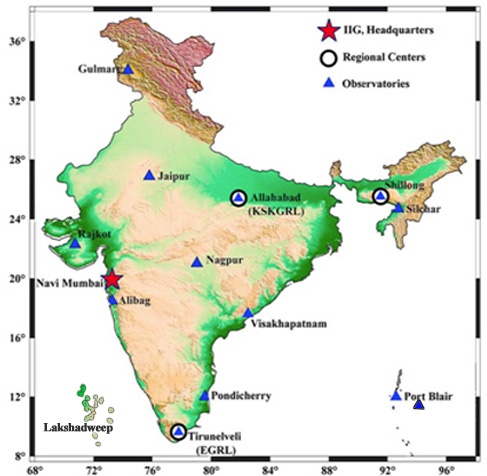The magnetic observatory network spread across the length and breadth of the country has contributed immensely in understanding the dynamics of ionospheric current systems over equatorial, low and middle latitudes. IIG’s geomagnetic observatory network spread from near dip equator to ~ 35 deg latitude, and from 70 to 92 deg E longitudes. The geomagnetic field variations on the surface of the Earth are due to internal as well as external sources. During geomagnetic quiet conditions, currents flowing in the ionosphere such as solar quiet (Sq) and equatorial electrojet (EEJ) mainly contribute as an external source.Long term variations of the geomagnetic field‐ also called as ‘secular variation’, originate inside the Earth's surface. The electrojet also controls the electrodynamics of the entire low latitudinal ionosphere. In addition to quiet time ionospheric currents, signatures of various magnetospheric currents get recorded in the ground magnetic observatory network.
IIG has developed Proton Precession Magnetometer (PPM) with resolution 0.1 nT, and recently improved its design.
Instrumentation section has taken up the Overhauser Magnetometer development project.
List of Facilities provided
Geomagnetic Services
Compass (ROSE) Certification
Runway Azimuth Determination
Generation of Isogonal Maps and Information
Data Acquisition and Preparation of Magnetic Declination Maps
Geomagnetic Observatory Consultancy: Instrumentation specifications & installation
Technical Consultancy for Geomagnetic Instruments
Manufacture of customized 0.1nT Proton Precession Magnetometers
Customized Data-loggers for geomagnetic instruments
Twelve magnetic observatories all over India:

Contact details
Dr. Gopi K. Seemala
gopi[dot]seemala[at]iigm[dot]res[dot]in
Mr. Prasant Kumar Tiwari
prasantkumar[dot]t[at]iigm[dot]res[dot]in